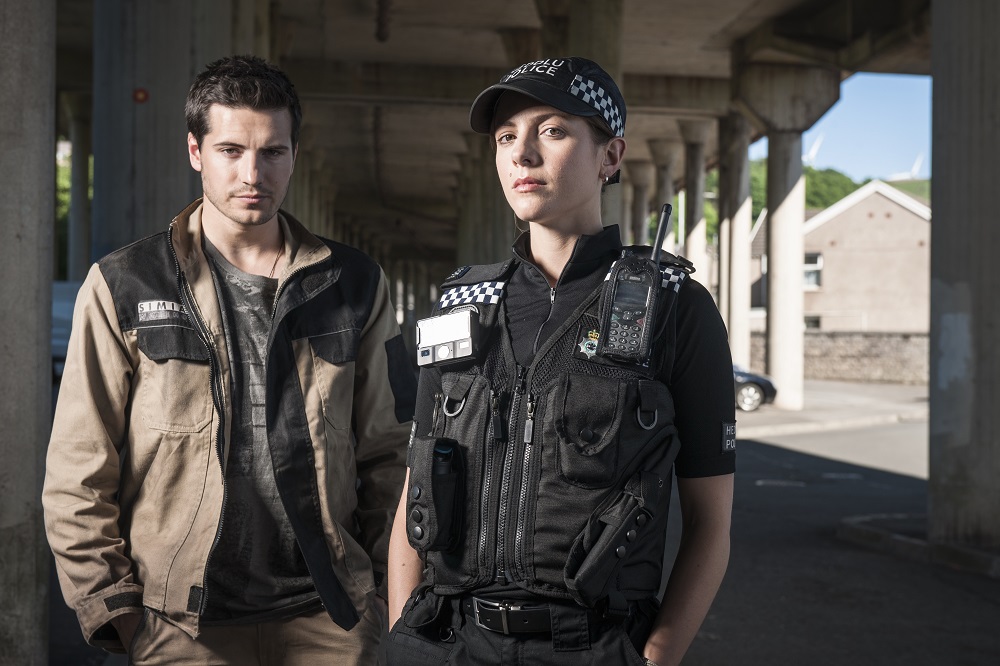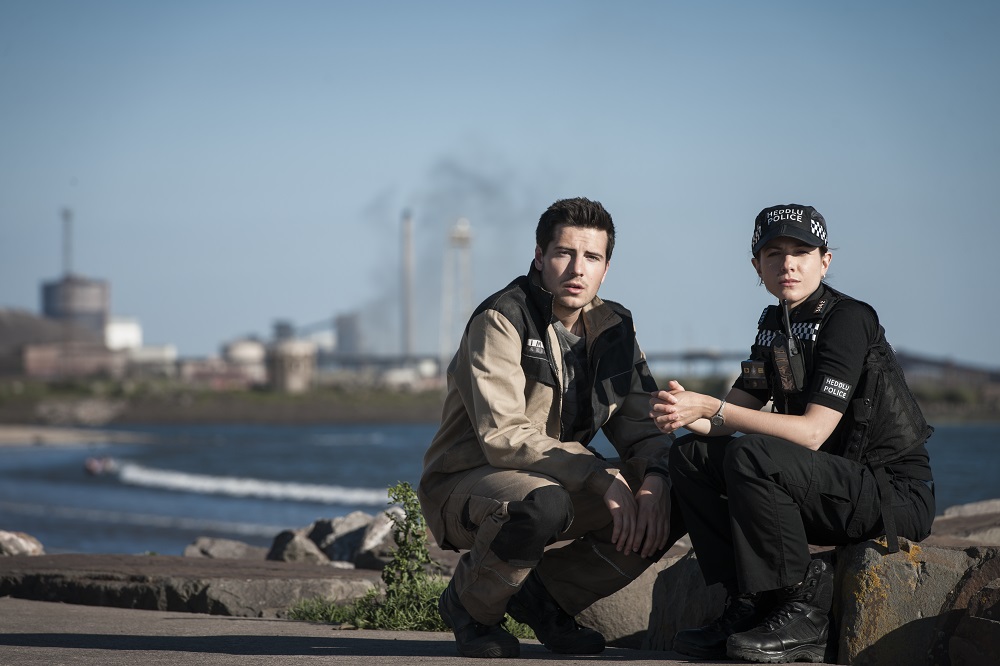Bilingual Port Talbot crime drama Bang gears up for second series

2019 will start with a bang for Roger Williams – quite literally, as the writer/producer gets ready to bring a new series of hit S4C gritty crime drama Bang to the small screen.
Drawing critical acclaim and securing best drama awards from BAFTA Cymru and the Celtic Media Festival, the thriller set in Port Talbot has been sold around the world, including the USA and Canada and will be screened on BBC Wales next year.
Audience figures were good and indicated that people with little or no Welsh were tuning in, as were as a significant number of viewers that were new to the channel or returning after a lengthy absence.
The series, described by writer/producer Roger Williams as “the story of a brother, a sister and a gun”, also attracted a significantly younger demographic than usual for an S4C drama.
Williams, who has just finished writing episode three of series two, tentatively scheduled to start shooting next spring, admits he was worried Bang might have been a tough sell to the broadcaster.
Not just because of its location but also his desire for the language of the programmes to reflect the day-to-day experience of most Welsh speakers but particularly those in towns like Port Talbot.
“I remember when I spoke to the drama commissioner at S4C about the show I said I want to make you a drama series set in Port Talbot,” he said.
“And I was totally expecting her to say to me ‘are you crazy’. But she didn’t at all and got really excited about making a drama series for S4C in an area like Port Talbot where, let’s be honest, there isn’t a great deal of Welsh spoken.
“For those who’ve seen the show, it’s a blend of Welsh and English. We decided that we were not going to pursue the model which shows like Hinterland are popular for, where they have made an English language and a Welsh language version and indeed a bilingual version.
“We decided that we would make one version of our show and the people would speak Welsh and English within that show in order to try and reflect a linguistic reality for the vast majority of Welsh speakers, where they will spend their day switching between the two languages and that was really liberating.
“One of the things that’s been reported back to us as producers is the number of couples who watched, the number of couples where one partner speaks Welsh. We were constantly hearing that they were sitting down to watch the show together whether as it went out on a Sunday night or whether they were catching up with the box set after transmission.
“They were watching a Welsh language drama series together often for the first time. And it was to do with the story and it was to do with the location and it was to do with the actor’s performances but it was also to do with the fact that because it contained a certain amount of English, people who didn’t speak Welsh or spoke very little Welsh, felt that it was accessible for them.”
‘Positive’
With a remit of producing Welsh language TV, S4C have to tread a delicate line with the percentage of English used in Welsh shows.
The channel was criticised by Cymdeithas yr Iaith in 2016 for running always-on English subtitles for a test period and has a statutory duty to broadcast programmes mainly in Welsh during peak hours but has also faced calls in recent years to broadcast more shows in English to boost the audience.
The response to Bang suggests they got the balance right and Williams says he was pleased with how the channel backed the series.
“Our experience with S4C on Bang couldn’t have been more positive,” he said. “We pitched the idea that it would contain English and there were discussions around how much English will there be.
“And largely I was saying, well there will be English spoken when the Police are at their work because that is a reflection of how the majority of police officers would operate when they are on the job.
“And there will be certain characters who don’t speak Welsh because that is dramatically interesting, when characters don’t understand some of the information that is being relayed in a scene. But there was never a formula.
“People who have watched the show will see that in some episodes there might only be 20% English. In others, I think episode eight is a good example of this, I think it’s more 60/40.
“So we were supported incredibly well in terms of S4C, that we should use language in order to tell the story in the best way possible.”

‘Welcoming’
Having written for stage and screen in both English and Welsh, winning BAFTA screenwriting awards for his work on Tir and Caerdydd and creating the award-winning drama series Gwaith/Cartref, Bang is the first crime drama Williams has written and he admits it meant heading into unfamiliar territory for him.
“It wasn’t something that was an instinctive genre for me but I was given that challenge and came up with the concept of a drama series that was about the journey of a gun and then I was searching for somewhere to locate it and that’s when I had that epiphany on Aberafon beach.
“I was walking my dog along the beach one Sunday and looked up and I thought this place should be seen on TV and it should be seen on TV outside of the context of there being a problem with Tata Steel, some threat to the steelworks or in a news report that isn’t about Michael Sheen’s return to the town to make a piece of theatre.
“It should have its own identity and I could not believe really that there hadn’t been another TV drama project that had taken advantage of Port Talbot’s landscapes.
“One of the things that is so attractive about shooting there is that you’ve got this magnificent beach in Aberafon, with sand dunes at one end and the steelworks and the three cranes in the distance.
“And you go into the housing estates and into the town and then you can get to the M4, which of course is travelled over by thousands of people every day who would never think of getting off at the junction for Port Talbot and exploring the town.
“But when you do, you see that beneath the M4 there is this community of people who literally have the pillars of the M4 motorway sunk into their back gardens and it’s a sort of other-worldly place, where you just hear the whoosh of traffic speeding over your head while people get on with their everyday lives.
“You go up then into Cwmafan and you’ve got the slopes of the valley, the forests, the aqueducts, the streams and the rivers and the wind farms. It really had so much to us in terms of a location. And the people were incredibly welcoming.
“We were present there overall for about five months and that’s something that we always try to do as well when we go and shoot somewhere. We try to embed ourselves in the community. We don’t just go there for a couple of weeks and shoot off back to Cardiff and film the rest of it.”
“We literally moved into Port Talbot, took possession of the old magistrates’ courts building in the centre of town. We built sets in there.
“We brought our editing suites to Port Talbot so that our editors would travel to Port Talbot and would get to know the crew and the cast and would get to know the area as well. And in doing that we built up relationships with local businesses, local schools and so forth.
“Hopefully we were able to encourage a number of people to tune in and watch the show they stumbled upon when they were walking their dogs along Aberafon beach one day and we were filming there. It became a bit of a talking point for the locals.”
The first series of Bang is on sale here for £27.99.
Support our Nation today
For the price of a cup of coffee a month you can help us create an independent, not-for-profit, national news service for the people of Wales, by the people of Wales.





